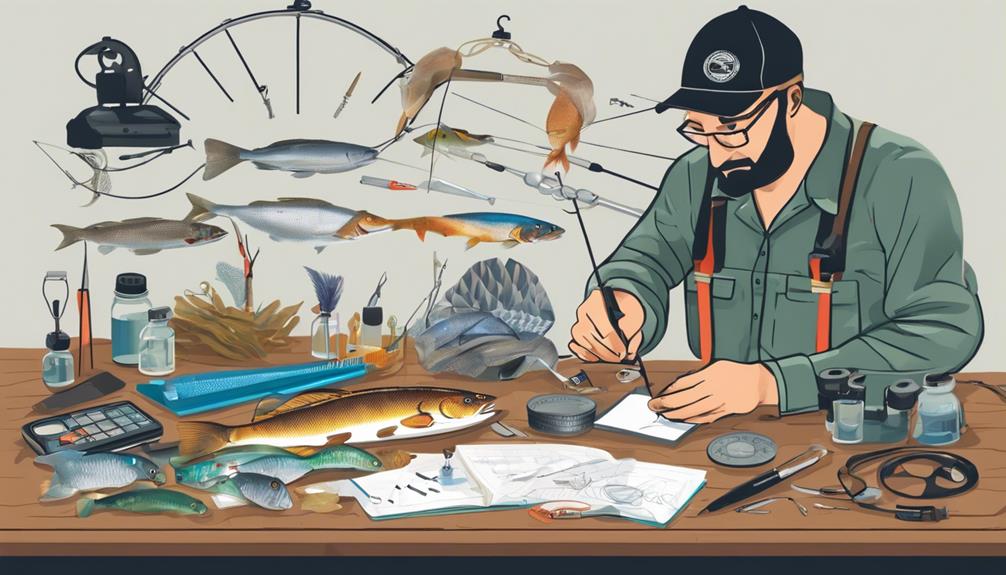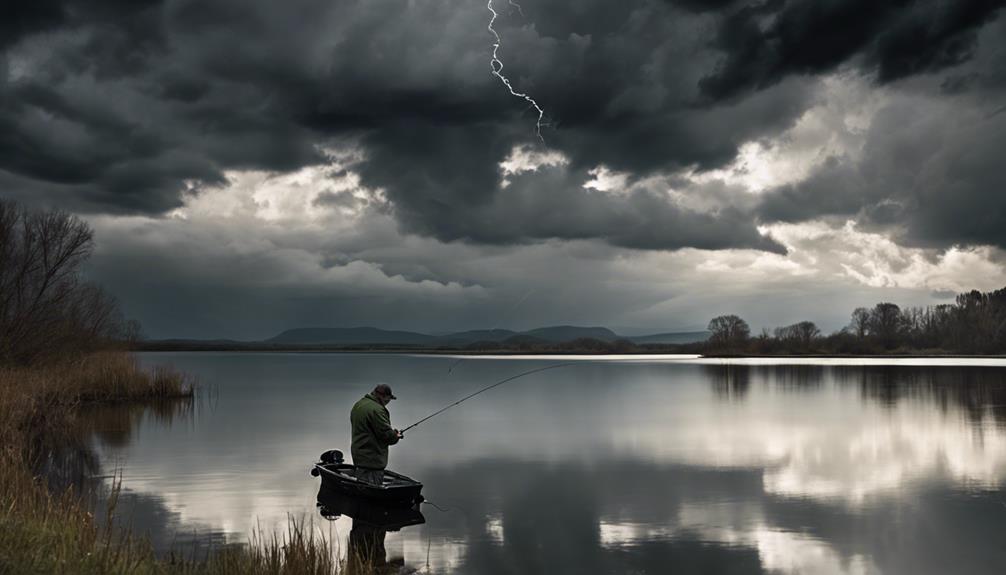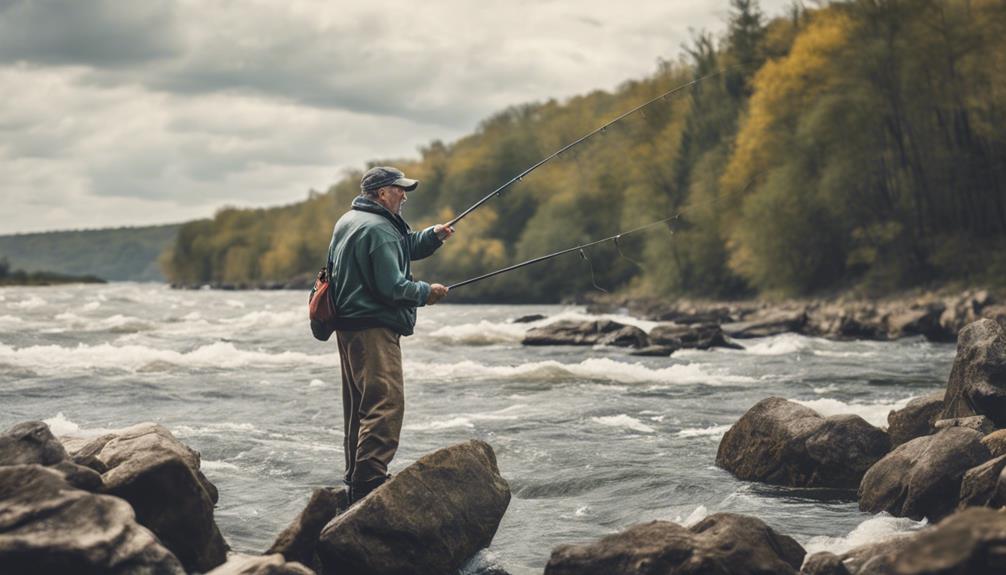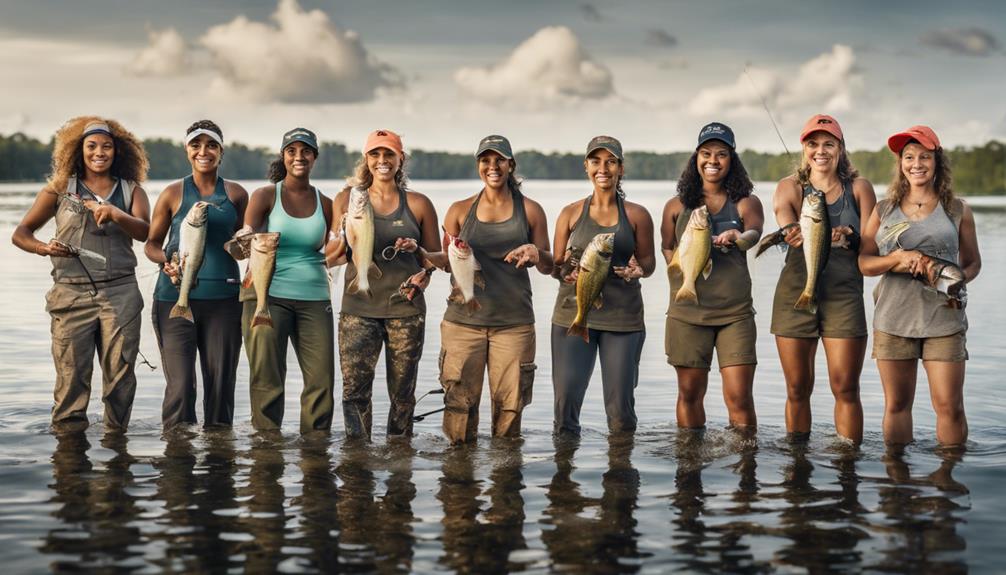You may not be aware that competitive angling involves a significant amount of scientific principles and methodologies. The intricate dance between angler and fish goes beyond mere luck or skill.
Have you ever considered how factors like fish behavior studies, water quality analysis, and even weather patterns can play a crucial role in determining success in fishing tournaments?
There's a fascinating world of scientific exploration that underpins the seemingly simple act of casting a line into the water.
Fish Behavior Studies
Studying fish behavior provides crucial insights into their feeding habits and movement patterns, essential for competitive angling success. By understanding predatory instincts, anglers can predict where fish are likely to be found and adjust their strategies accordingly. Fish, especially predatory species, exhibit specific behaviors when hunting for prey. These behaviors can include stalking, ambushing, or chasing their targets. Recognizing these patterns can give anglers a significant advantage in targeting specific species.
Feeding habits play a vital role in determining the success of an angler. Different fish species have varied diets and feeding behaviors, which influence their movement and activity levels. For example, carnivorous fish will actively hunt for prey, while herbivorous species may feed on plant matter or algae in a more passive manner. By studying the feeding habits of target species, anglers can select appropriate bait and lures to attract fish effectively.
Observing fish behavior underwater can also help anglers understand how environmental factors influence their movements. By recognizing how factors such as water temperature, light levels, and currents affect fish behavior, anglers can adapt their techniques to maximize their chances of a successful catch. Ultimately, a thorough understanding of fish behavior is essential for competitive anglers looking to improve their skills and achieve greater success on the water.
Water Quality Analysis
Analyzing the quality of water is crucial for competitive anglers aiming to understand the environment in which they fish. Aquatic habitat assessment plays a vital role in determining the health of the ecosystem and the presence of fish species. By conducting thorough aquatic habitat assessments, anglers can gain insights into the water's temperature, oxygen levels, turbidity, and nutrient content, all of which directly impact the fish populations in the area.
Chemical analysis techniques are commonly employed to assess water quality. These techniques involve testing for various parameters such as pH, dissolved oxygen, nitrates, phosphates, and heavy metals. Monitoring these chemical components helps anglers evaluate the overall health of the aquatic environment and predict the availability of fish in specific areas.
Understanding water quality is essential for competitive anglers to make informed decisions regarding where and how to fish. By analyzing the chemical composition of water bodies, anglers can identify potential fishing hotspots and adjust their strategies accordingly. Moreover, maintaining high water quality standards is crucial for the preservation of fish populations and the sustainability of angling activities in the long run. Therefore, mastering water quality analysis techniques is fundamental for anglers seeking to enhance their competitive edge and contribute to the conservation of aquatic ecosystems.
Equipment Technology Advancements
Innovations in equipment technology have revolutionized competitive angling, enhancing the experience for anglers worldwide. Tackle innovation and gear evolution have played a crucial role in shaping modern angling practices. From advanced materials that make tackle lighter and more durable to innovative designs that improve functionality, anglers now have access to a wide array of cutting-edge equipment that can significantly impact their performance on the water.
Rod design has seen remarkable advancements in recent years, with manufacturers incorporating new materials and construction techniques to create rods that are lighter, more sensitive, and stronger than ever before. These developments have enabled anglers to cast with greater accuracy, detect subtle bites more effectively, and battle larger fish with confidence.
Similarly, reel development has pushed the boundaries of what's possible in angling. The introduction of high-performance drag systems, precision-engineered gear ratios, and ergonomic designs has transformed the way anglers approach different fishing scenarios. Whether you're targeting freshwater bass or saltwater marlin, there's a reel tailored to meet your specific needs.
Tournament Strategy Formulation
Developing a winning tournament strategy requires a deep understanding of the competition and strategic planning tailored to your strengths as an angler. To excel in competitive angling, you must delve into angler psychology to anticipate your opponents' moves and reactions. Strategic planning is essential; it involves analyzing past performances, identifying patterns, and adapting your approach accordingly. By incorporating statistical modeling and decision-making algorithms, you can enhance your strategic decision-making process. These tools help you weigh different variables, such as fishing locations, bait selection, and time management, to optimize your chances of success.
Angler psychology plays a crucial role in tournament strategy formulation. Understanding how competitors think and behave can give you a strategic edge. By studying their past behaviors and tendencies, you can predict their actions on the water and adjust your strategy accordingly. This psychological insight allows you to anticipate potential challenges and proactively address them during the competition.
Strategic planning isn't just about reacting to the present; it's about preparing for future scenarios. By utilizing statistical modeling and decision-making algorithms, you can simulate different tournament scenarios and evaluate the best course of action in each situation. This proactive approach enables you to make informed decisions on the water, increasing your odds of achieving success in competitive angling.
Weather Pattern Interpretation
Interpreting weather patterns is crucial for maximizing your success in competitive angling. By understanding meteorological predictions and how they impact temperature fluctuations, you can significantly improve your chances of landing that winning catch. Weather plays a key role in the behavior of fish, influencing where they move and how they feed.
Meteorological predictions provide valuable insights into upcoming weather conditions, helping you anticipate changes in temperature, wind patterns, and precipitation. This information is essential for determining the best times and locations to fish during a tournament. For example, if a cold front is approaching, fish may become more active before the front arrives but then slow down during and after its passage. Being aware of these patterns can give you a strategic advantage over competitors who aren't as attuned to the weather.
Temperature fluctuations also play a significant role in fish behavior. Fish are cold-blooded creatures, meaning their body temperature fluctuates based on their environment. Understanding how temperature changes impact fish activity levels can help you adjust your angling techniques accordingly. For instance, during a sudden temperature drop, fish may move to deeper waters to find warmer temperatures, requiring you to adapt your fishing depth and bait presentation to remain successful.
Biology of Targeted Species
How does understanding the biology of the targeted species enhance your competitive angling performance?
Knowledge of the reproductive patterns, migration behaviors, feeding habits, and genetics of the species you're targeting can significantly improve your success in competitive angling. By understanding when and where fish are most likely to spawn, migrate, or feed, you can strategically position yourself in the right areas at the right times, increasing your chances of catching more fish.
Reproductive patterns play a crucial role in determining the behavior of fish. Knowing the spawning seasons and locations of different species allows you to target them more effectively during these periods, increasing your chances of hooking a big catch. Similarly, understanding migration patterns can help you anticipate where fish will be at different times of the year, guiding your angling efforts.
Feeding habits are another essential aspect of a fish's biology to consider. Different species have varying diets and feeding behaviors, so tailoring your bait and techniques to match these preferences can attract more bites. Genetics also play a role in determining a fish's behavior and traits, such as growth rates and aggressiveness, which can influence your angling strategies.
Data Analytics in Angling
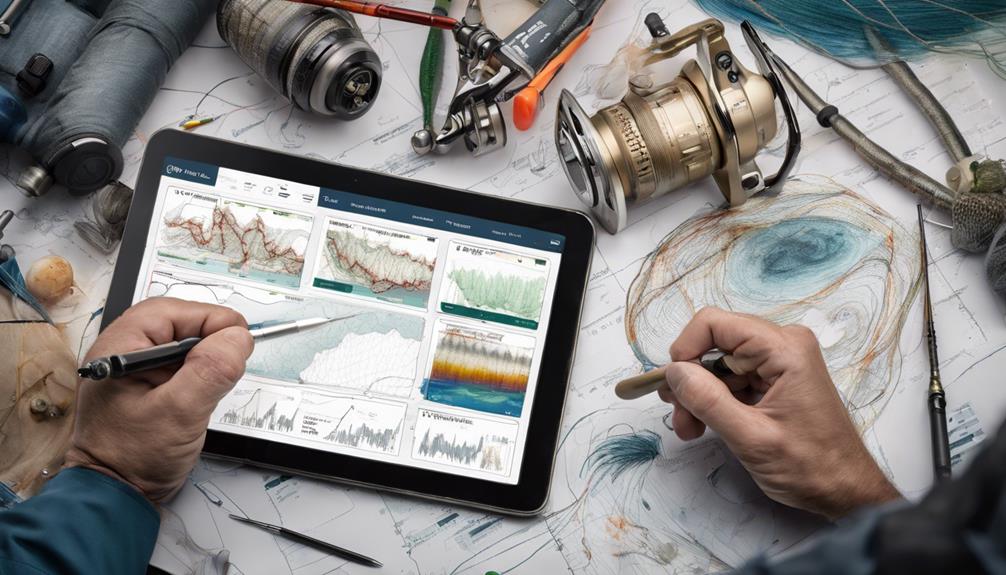
Understanding the biology of the targeted species can be further optimized through the integration of data analytics in angling practices. By analyzing catch rate data, anglers can gain valuable insights into the behavior and preferences of different fish species. Utilizing predictive modeling techniques allows anglers to anticipate fish movements based on factors like water temperature, time of day, and bait preferences. This data-driven approach not only enhances the efficiency of angling but also contributes to the sustainability of fish populations.
Catch rate data serves as a crucial tool in determining the effectiveness of various angling strategies. Analyzing catch rates over time can help anglers identify patterns and trends, enabling them to adjust their techniques for better results. Additionally, predictive modeling allows anglers to make informed decisions about where and when to fish, increasing the likelihood of a successful catch.
Incorporating data analytics into angling practices not only improves the overall fishing experience but also aids in conservation efforts. By understanding the factors that influence catch rates, anglers can minimize their impact on fish populations and ecosystems. Through the strategic application of predictive modeling, anglers can engage in sustainable angling practices that support the long-term health of aquatic environments.
Environmental Impact Assessment
To evaluate the environmental impact of angling practices, conduct thorough assessments of the ecosystems affected. Ecological monitoring plays a crucial role in understanding how competitive angling activities influence the local flora and fauna. By closely observing changes in biodiversity, population dynamics, and habitat health, conservation efforts can be targeted effectively. Sustainable fishing practices are essential to mitigate negative impacts. Implementing catch limits, using barbless hooks, and practicing catch-and-release can help maintain fish populations and preserve aquatic ecosystems.
Habitat restoration is another key aspect of environmental impact assessment in angling. Efforts to restore damaged habitats, such as wetlands or riverbanks, can enhance the overall health of the ecosystem. Creating artificial structures like fish habitats or planting native vegetation can provide benefits to both fish populations and other wildlife. By actively participating in habitat restoration projects, anglers contribute to the conservation of natural resources and promote sustainable angling practices.
Frequently Asked Questions
How Do Competitive Anglers Navigate the Mental Challenges of High-Pressure Tournaments?
When facing high-pressure tournaments, competitive anglers rely on mental resilience and effective pressure management techniques.
To navigate the challenges, it's crucial to maintain focus and employ concentration strategies. Stay calm under pressure by practicing deep breathing or visualization exercises. Keep a positive mindset and trust your skills to perform at your best when it counts the most.
What Role Does Luck Play in Competitive Angling and How Do Anglers Account for It?
Luck management is crucial in competitive angling. Angler strategies often involve minimizing luck factors by focusing on skill and preparation.
Weather forecasting helps in anticipating conditions, influencing equipment selection. By understanding probabilities and adapting to changing circumstances, anglers can reduce the impact of luck and increase their chances of success.
Ultimately, a balance between skill and luck management is key in competitive angling.
How Do Competitive Anglers Stay Physically Fit to Endure Long Hours on the Water?
To stay physically fit for long hours on the water, competitive anglers focus on physical endurance and nutrition. They engage in activities like running, swimming, or weight training. Eating a balanced diet with plenty of protein and healthy carbs helps sustain energy levels.
Additionally, mental resilience is crucial. Some anglers practice meditation to stay focused and calm during intense competitions. Prioritizing both physical and mental health is key to excelling in competitive angling.
What Are Some Common Ethical Dilemmas Faced by Competitive Anglers and How Do They Address Them?
When you compete in angling, ethical decisions play a big role. Sportsmanship is key in handling common dilemmas like catch limits. Conservation efforts are vital, so knowing when to release a fish or keep it's crucial.
Striking a balance between competition and sustainability is a challenge you face. Adhering to rules and respecting the environment ensures fair play and helps maintain fish populations for future generations.
How Do Competitive Anglers Balance Their Passion for Fishing With Other Aspects of Their Lives, Such as Work and Family?
Balancing commitments is key for competitive anglers. You juggle your passion for fishing with work and family through smart time management. Setting priorities helps you allocate time effectively.
Whether it's prepping gear after work or spending weekends on the water, finding harmony is crucial. Communicating with loved ones about your fishing schedule fosters understanding and support.
Ultimately, striking a balance ensures you can excel in angling while fulfilling other responsibilities.
Conclusion
In conclusion, competitive angling is a scientific endeavor due to the extensive studies on:
- fish behavior
- water quality analysis
- advancements in equipment technology
- formulation of tournament strategies
- interpretation of weather patterns
- understanding the biology of targeted species
- data analytics
- assessment of environmental impacts
By combining these elements, anglers are able to approach fishing as a science, utilizing data and research to improve their skills and increase their chances of success in tournaments.
